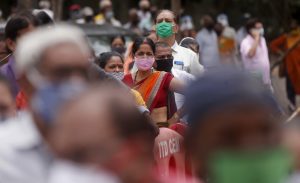Crematoriums in India are melting under the pressure of so many dead bodies, hospitals have run out of oxygen, and people have taken to social media to plead for help. India is undergoing a dystopian public health emergency and the current policy paralysis is making the situation worse.
On Thursday, India hit a new, devastating record: 314,835 new COVID-19 cases in a single day. Every day, more than 2,000 people die from the coronavirus in the second most populous country in the world, and that is just the official estimate. Given rampant underreporting of data, deaths due to the COVID-19 pandemic are estimated to be at least 10 times larger than the official tally and total cases are predicted to be 29 times higher than officially reported.
In a national address by Prime Minister Narendra Modi on April 20, the Indian government abdicated all responsibilities to the state governments when it comes to lockdowns and migrant laborers. It has also divested the responsibility to raise awareness about COVID-19 protocols to its citizens. While cases were multiplying exponentially, Modi and Home Minister Amit Shah were spotted until last week holding large-scale rallies for the upcoming elections and boasting about the size of their crowds.
Individuals and non-profit organizations have taken over the job of the state in helping provide food, medicine, and hospital beds to the sick through social media. Social media kits that were decried as sedition just a few months ago are now saving lives. Even V.K. Singh, India’s minister of state for road transport and highways and an MP from the Hindu nationalist Bharatiya Janata Party (BJP) in Uttar Pradesh, resorted to Twitter for help.
Given rapidly depleting resources, individual efforts alone will not be enough. The Lancet COVID-19 Commission endorsed a few urgent measures that can be undertaken by the government: an accelerated vaccination drive, public advocacy campaigns on wearing masks, bans on mass gatherings and “superspreader events,” scaling up RT-PCR testing, and strengthening India’s health system. The commission called for a “middle ground,” as it does not recommend a blanket national or state lockdown and instead calls for localized, phased restrictions or closures.
In many countries, studies have shown that lockdowns assist in bringing down coronavirus transmission rates. However, given the precarity and informality of labor in Indian cities, blanket lockdowns without social provisions could further impair India’s crippled economy, affecting the poorest most. One week of lockdown cost India 2 percent of its GDP last year.
The informal sector employs 80 percent of India’s workforce and one-third work as casual laborers. Last year, when the Indian government announced an abrupt lockdown, India’s cities witnessed a large migrant exodus. The government estimates that there may be more than 100 million migrant laborers in India and more than 11 million returned home, many on foot, as they lost their jobs and cash ran out. Nearly 1,000 migrant workers died. The pandemic has pushed 75 million people into poverty in India. India is already seeing an uptick in job losses and a new migrant exodus as some cities tighten their COVID-19 measures.
Targeted Lockdowns: An Urgent Policy Alternative
With less than 1,500 cases and 35 confirmed deaths in 2020, Vietnam has become a COVID-19 success story due to their commune-level targeted lockdown strategy, accompanied with travel bans, business closures, mass quarantines, and widespread testing in suspected hotspots. This is aided by a decisive central government and a well developed public health system.
According to a one MIT study, targeted lockdowns not only save lives but also reduce economic damage from 24.3 percent to 12.8 percent.
Last year, cases in New York City began going down after it implemented targeted block by block lockdowns. Similarly, Malaysia with its rising cases has decided to enforce targeted lockdowns. As cases rise in parts of the United States, President Joe Biden is being advised to enforce targeted lockdowns in very specific areas, which would protect both the economy and people.
India can follow the same model of targeting different mohallas, allowing people living in other areas of the city to contribute economically and not overburden the healthcare services. Blanket lockdowns are difficult to implement politically in India long enough to stamp out the virus. Politicians are already distracted fighting for elections rather than fighting for their citizens’ lives.
The coronavirus is going to be endemic and it will circulate globally for years to come with different variants. Developing countries like India cannot enforce lockdowns each time cases start to rise. The human cost is too high. Instead, an alternative is to impose targeted lockdowns.

































